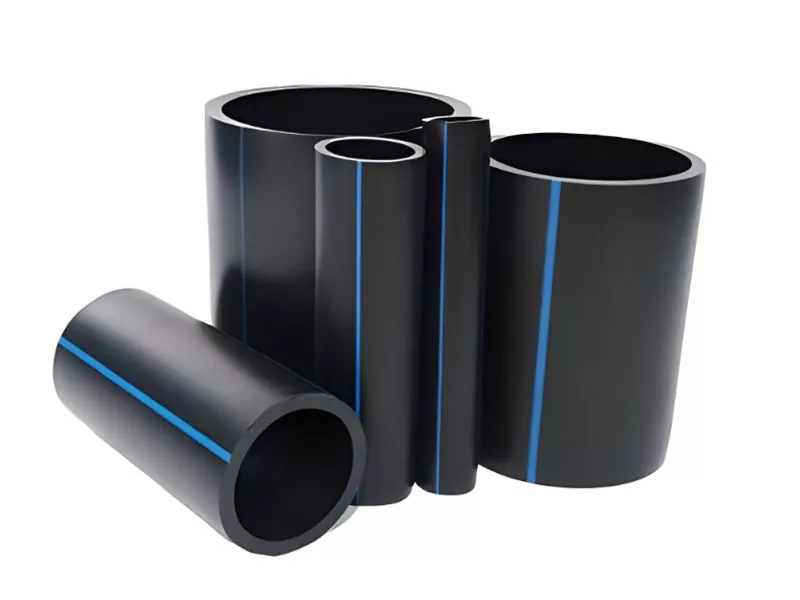Recognizing the Trick Benefits of HDPE Pipeline for Water and Wastewater Administration
The use of HDPE pipeline in water and wastewater administration presents many advantages that merit factor to consider. Its phenomenal longevity and long life expectancy make it a favored selection for lots of projects. Additionally, the material's resistance to deterioration and chemical damages boosts its integrity in different atmospheres. Nevertheless, the advantages expand beyond simply long life and resistance. Discovering its cost-effectiveness and environmental influence exposes a lot more engaging reasons for its prevalent fostering in modern infrastructure
Phenomenal Sturdiness and Longevity

HDPE pipeline stands apart for its extraordinary durability and durability, making it a recommended selection in water monitoring systems. Constructed from high-density polyethylene, these pipes can withstand substantial stress and tension, making certain trustworthy performance in time. Their durable nature allows them to endure severe environmental conditions, including temperature level changes and soil motions, which can create various other products to fall short.
The lifespan of HDPE pipes frequently surpasses 50 years, providing an affordable service for districts and industries alike. Additionally, the product's light-weight residential or commercial properties streamline installment, lowering labor expenses and durations. This durability minimizes the demand for constant repair work or replacements, better improving its financial appeal.
In water administration applications, the reliability of HDPE pipelines means fewer interruptions and improved service connection, making them important to lasting facilities advancement. The mix of toughness and durability strengthens HDPE's role as a cornerstone in efficient water management services.

Resistance to Corrosion and Chemical Damage
While lots of materials succumb to rust and chemical damage gradually, HDPE pipes display remarkable resistance, making them excellent for various water management applications. This resilience originates from the molecular framework of high-density polyethylene, which is naturally non-reactive and does not corrode like steels or deteriorate from direct exposure to extreme chemicals. Because of this, HDPE is highly effective in atmospheres with aggressive materials, such as wastewater systems that may contain acids, bases, and natural solvents.
Furthermore, HDPE pipes can withstand ecological aspects such as dirt acidity and saline problems, additionally boosting their viability for diverse applications (custom hdpe pipe manufacturing Midland TX). Their ability to maintain architectural integrity in time minimizes the danger of leakages and failures, which is important in ensuring the safety and reliability of water distribution and wastewater administration systems. Subsequently, the resistance to corrosion and chemical damage significantly contributes to the general effectiveness and long life of HDPE piping solutions
Cost-Effectiveness and Financial Benefits
When considering the monetary ramifications of water monitoring systems, the cost-effectiveness of HDPE pipelines becomes obvious. These pipelines offer lower installation and upkeep costs contrasted to standard products like steel or concrete. Their light-weight nature simplifies transport and setup, resulting in lowered labor expenditures. Additionally, HDPE pipes exhibit a lengthy life expectancy, typically going beyond 50 years, which converts to fewer have a peek at these guys substitutes and lasting financial savings.
Furthermore, the resistance of HDPE to deterioration and chemical damages lessens the need for costly repairs and substitutes. The pipes also sustain effective water flow, reducing power expenses related to pumping systems. By mitigating leakages and water loss, HDPE pipelines add to significant economic advantages for municipalities and markets alike. In general, the first financial investment in HDPE piping can produce substantial economic returns over the lifespan of the water management system, making it a prudent option for sustainable framework development.
Ecological Sustainability and Reduced Effect

Versatility and Adaptability in Setup
Due to the fact that of their special residential or commercial properties, HDPE pipes provide remarkable flexibility and flexibility in installment, making them appropriate for a wide variety of applications. Their lightweight nature permits much easier handling and transport, minimizing labor costs and installation time. HDPE pipes can be bent and shaped to fit different surfaces and job demands, which is specifically beneficial in testing settings.
Additionally, their resistance to rust and chemical damage permits for setup in varied setups without the need for specialized protective finishes. The ability to fuse joints produces a continuous, leak-free system, improving the total integrity and reliability of the installation. HDPE's adaptability additionally suits ground motion, reducing the threat of damage in areas prone to shifting soil. Overall, these features make HDPE pipes not only versatile however additionally a favored choice for water and wastewater administration systems.
Regularly Asked Questions
Just How Does HDPE Pipeline Compare to PVC in Water Monitoring Applications?
HDPE pipeline provides premium adaptability, resistance to corrosion, and sturdiness contrasted to PVC. Its lighter weight promotes simpler installation, while its lengthy life expectancy decreases replacement costs, making HDPE a favored option in water management applications.
What Is the Lifespan of HDPE Pipes Under Typical Conditions?
Under typical conditions, HDPE pipes can have a life expectancy varying from 50 to 100 years. Their resilience and resistance to deterioration add to their long-lasting efficiency in numerous applications, making them a dependable selection for framework.
Are HDPE Water Lines Recyclable After Their Solution Life?
Yes, HDPE pipes are recyclable Look At This after their solution life. Pipe Manufacturing Midland TX. They can be processed and repurposed into brand-new items, substantially lowering ecological effect and advertising sustainability within the industry, making them an environmentally friendly selection for piping services
What Is the Installment Refine for HDPE Piping?
The setup procedure for HDPE pipelines involves site prep work, trenching, pipe fusion or mechanical joining, backfilling, and stress screening. Proper techniques ensure a sturdy and effective system for carrying water and wastewater effectively.
Can HDPE Water Lines Be Made Use Of for Both Potable and Non-Potable Water Equipments?
Yes, HDPE pipelines can be made use of for both safe and clean and non-potable water systems. Their adaptability, durability, and resistance to rust make them suitable for numerous applications, ensuring risk-free and efficient transport of water in different Discover More Here contexts.